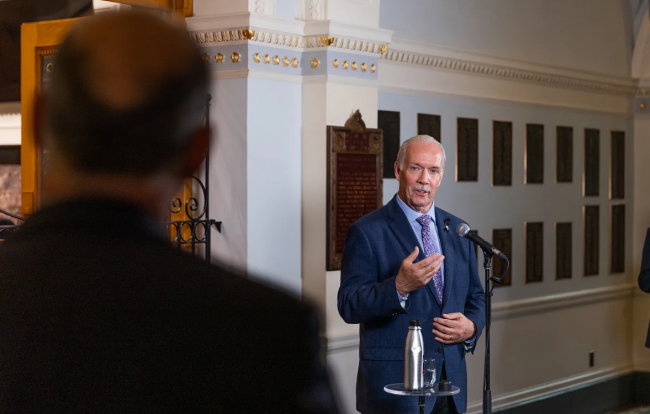Articles Menu

Oct. 20, 2022
The B.C. NDP used to have lots of environmentalists.
Let’s not forget that the B.C. NDP created the Agricultural Land Reserve when Dave Barrett was premier.
During these years from 1972 to 1975, there was a doubling of parks and wilderness areas, including the formation of Cypress Provincial Park on the North Shore
Barrett’s successor as B.C. NDP leader, Bob Skelly, was a hobby farmer with a deep interest in the environment and Indigenous issues. Skelly opposed uranium mining. He also fought against the Site C dam along the Peace River.
Skelly’s successor, Mike Harcourt, maintained the B.C. NDP’s greenish hue by agreeing to a science-based approach to Clayoquot Sound forests, introducing a forest-practices code, and appointing Stephen Owen to chair a commission on resources and the economy.
John Cashore was a respected environment minister in the Harcourt government. Cashore was succeeded by Moe Sihota, who oversaw the creation of 200 new parks.
Then the B.C. NDP came under the sway of the fossil-fuel industry in the mid to late 1990s after Glen Clark became premier. He named North Coast MLA Dan Miller as deputy premier and later, as minister of energy and mines. It was Miller who created the Oil and Gas Commission, which gave the fossil-fuel industry a free ride in northeastern B.C.
As premier, Clark supported three gas-fired power plants on Vancouver Island, which would be supplied by a gas pipeline from the mainland. That never got off the ground due to financial reasons. But Clark managed to prevent the B.C. Utilities Commission from reviewing power projects for their environmental and social costs. As premier, he also kept the greenhouse-gas-spewing Burrard Thermal power plant operating in Port Moody.
Clark irritated many environmentalists with his government’s cavalier approach to greenhouse gas emissions, including at Burrard Thermal. He left a bad impression with his decision to remove the Six Mile Ranch from the Agricultural Land Reserve. He even claimed that Greenpeace was an enemy of B.C. He also fought with then federal environment minister David Anderson, who wanted to preserve wild salmon stocks.
Clark’s decision to build the Millennium Line through five B.C. NDP ridings undermined a regional transportation plan. That upset those who favoured street-level light rail. But Clark couldn’t abide by giving up roadspace for train travel.
Eventually, Clark resigned in connection with a casino licensing issue, clearing the way for Miller to become premier for a short period. Miller’s chief of staff was John Horgan.
During the Clark-Miller years, environmentalists left the party in droves, contributing to an election debacle in 2001 when the B.C. NDP only won two seats.
The B.C. NDP continued showing an anti-environmental side from time to time through the Carole James years, opposing a carbon tax. That helped Gordon Campbell’s B.C. Liberals win the 2009 election.
As energy critic in those years, Horgan repeatedly called for lower gas prices. After becoming premier, he scrapped road tolls, even though regional politicians felt they were an effective demand-side measure to reduce emissions.
Today on the television news, a grumpy Horgan made it sound as though B.C. Green Party interlopers were trying to take over the B.C. NDP. The reality, however, is that Horgan was a key architect of policies that drove many environmentally inclined New Democrats out of the party.
He did this by proceeding with the Site C dam, which is being built to provide electricity to a huge liquefied natural-gas plant in Kitimat. He did it by offering $6 billion in incentives to a consortium to construct this project. He did it by not seriously addressing fracking of natural gas. And he did it by failing to fight the Trans Mountain pipeline expansion.
Horgan has also been a cheerleader of carbon capture and underground storage, which has a dubious record in reducing greenhouse gas emissions. The industry cites its potential to justify more drilling and fracking.
The B.C. NDP’s historic supporters—the environmental community—want a chance to shape party policies now that the fossil-fuel industry’s mascot, John Horgan, is on his way out.
Yet the gang in charge doesn't want them to return. And the press gallery isn’t much interested in educating the public about the party’s glorious history of green initiatives
That’s the real story behind the vetoing of Anjali Appadurai’s leadership ambitions. It should be clear to everyone that the B.C. NDP is a closed shop.
The sooner environmentalists realize this, the faster they’ll get on with the business of replacing it.
[Top photo: Premier John Horgan has supported fossil-fuel interests throughout his career.]